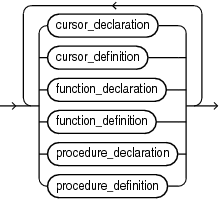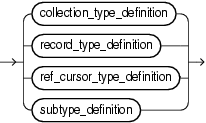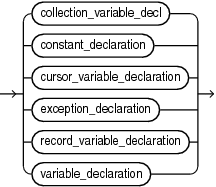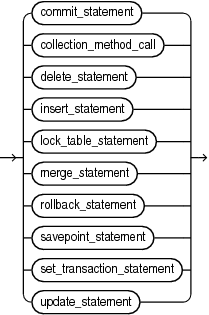14.6 Block
The block, which groups related declarations and statements, is the basic unit of a PL/SQL source program.
It has an optional declarative part, a required executable part, and an optional exception-handling part. Declarations are local to the block and cease to exist when the block completes execution. Blocks can be nested.
An anonymous block is an executable statement.
Topics
Syntax
item_list_1 ::=
(cursor_declaration ::=, function_declaration ::=, item_declaration ::=, procedure_declaration ::=, type_definition ::=)
item_list_2 ::=
(cursor_declaration ::=, cursor_definition ::=, function_declaration ::=, function_definition ::=, procedure_declaration ::=, procedure_definition ::=)
type_definition ::=
(collection_type_definition ::=, record_type_definition ::=, ref_cursor_type_definition ::=, subtype_definition ::=)
subtype_definition ::=
constraint ::=
item_declaration ::=
(collection_variable_decl ::=, constant_declaration ::=, cursor_declaration ::=, cursor_variable_declaration ::=, exception_declaration ::=, record_variable_declaration ::=, variable_declaration ::=)
statement ::=
procedure_call ::=
sql_statement ::=
Semantics
plsql_block
label
Undeclared identifier, unique for the block.
DECLARE
Starts the declarative part of the block.
declare_section
Contains local declarations, which exist only in the block and its sub-blocks and are not visible to enclosing blocks.
Restrictions on declare_section
-
A
declare_sectionincreate_package,create_package_body, orcompound_trigger_blockcannot includePRAGMAAUTONOMOUS_TRANSACTION. -
A
declare_sectionintrigger_bodyortps_bodycannot declare variables of the data typeLONGorLONGRAW.
See Also:
-
"CREATE PACKAGE Statement" for more information about
create_package -
"CREATE PACKAGE BODY Statement" for more information about
create_package_body -
"CREATE TRIGGER Statement" for more information about
compound_trigger_block,trigger_body, andtps_body
subtype_definition
Static expressions can be used in subtype declarations. See Static Expressions for more information.
subtype
Name of the user-defined subtype that you are defining.
base_type
Base type of the subtype that you are defining. base_type can be any scalar or user-defined PL/SQL datatype specifier such as CHAR, DATE, or RECORD.
CHARACTER SET character_set
Specifies the character set for a subtype of a character data type.
Restriction on CHARACTER SET character_set
Do not specify this clause if base_type is not a character data type.
NOT NULL
Imposes the NOT NULL constraint on data items declared with this subtype. For information about this constraint, see "NOT NULL Constraint".
constraint
Specifies a constraint for a subtype of a numeric data type.
Restriction on constraint
Do not specify constraint if base_type is not a numeric data type.
precision
Specifies the precision for a constrained subtype of a numeric data type.
Restriction on precision
Do not specify precision if base_type cannot specify precision.
scale
Specifies the scale for a constrained subtype of a numeric data type.
Restriction on scale
Do not specify scale if base_type cannot specify scale.
RANGE low_value .. high_value
Specifies the range for a constrained subtype of a numeric data type. The low_value and high_value must be numeric literals.
Restriction on RANGE high_value .. low_value
Specify this clause only if base_type is PLS_INTEGER or a subtype of PLS_INTEGER (either predefined or user-defined). (For a summary of the predefined subtypes of PLS_INTEGER, see Table 4-3. For information about user-defined subtypes with ranges, see "Constrained Subtypes".)
body
BEGIN
Starts the executable part of the block, which contains executable statements.
EXCEPTION
Starts the exception-handling part of the block. When PL/SQL raises an exception, normal execution of the block stops and control transfers to the appropriate exception_handler. After the exception handler completes, execution resumes with the statement following the block. For more information about exception-handling, see PL/SQL Error Handling.
exception_handler
See "Exception Handler".
END
Ends the block.
name
The name of the block to which END applies—a label, function name, procedure name, or package name.
statement
label
Undeclared identifier, unique for the statement.
assignment_statement
See "Assignment Statement".
basic_loop_statement
See "Basic LOOP Statement".
case_statement
See "CASE Statement".
close_statement
See "CLOSE Statement".
collection_method_call
Invocation of one of these collection methods, which are procedures:
-
DELETE -
EXTEND -
TRIM
For syntax, see "Collection Method Invocation".
continue_statement
See "CONTINUE Statement".
cursor_for_loop_statement
See "Cursor FOR LOOP Statement".
execute_immediate_statement
See "EXECUTE IMMEDIATE Statement".
exit_statement
See "EXIT Statement".
fetch_statement
See "FETCH Statement".
for_loop_statement
See "FOR LOOP Statement".
forall_statement
See "FORALL Statement".
goto_statement
See "GOTO Statement".
if_statement
See "IF Statement".
null_statement
See "NULL Statement".
open_statement
See "OPEN Statement".
open_for_statement
See "OPEN FOR Statement".
pipe_row_statement
See "PIPE ROW Statement".
Restriction on pipe_row_statement
This statement can appear only in the body of a pipelined table function; otherwise, PL/SQL raises an exception.
raise_statement
See "RAISE Statement".
return_statement
See "RETURN Statement".
select_into_statement
See "SELECT INTO Statement".
while_loop_statement
See "WHILE LOOP Statement".
procedure_call
procedure
Name of the procedure that you are invoking.
parameter [, parameter ]...
List of actual parameters for the procedure that you are invoking. The data type of each actual parameter must be compatible with the data type of the corresponding formal parameter. The mode of the formal parameter determines what the actual parameter can be:
| Formal Parameter Mode | Actual Parameter |
|---|---|
|
|
Constant, initialized variable, literal, or expression |
|
|
Variable whose data type is not defined as |
|
|
Variable (typically, it is a string buffer or numeric accumulator) |
If the procedure specifies a default value for a parameter, you can omit that parameter from the parameter list. If the procedure has no parameters, or specifies a default value for every parameter, you can either omit the parameter list or specify an empty parameter list.
sql_statement
commit_statement
SQL COMMIT statement. For syntax, see Oracle Database SQL Language Reference.
delete_statement
SQL DELETE statement. For syntax, see Oracle Database SQL Language Reference. See also "DELETE Statement Extension".
insert_statement
SQL INSERT statement. For syntax, see Oracle Database SQL Language Reference. See also "INSERT Statement Extension".
lock_table_statement
SQL LOCK TABLE statement. For syntax, see Oracle Database SQL Language Reference.
merge_statement
SQL MERGE statement. For syntax, see Oracle Database SQL Language Reference.
rollback_statement
SQL ROLLBACK statement. For syntax, see Oracle Database SQL Language Reference.
savepoint_statement
SQL SAVEPOINT statement. For syntax, see Oracle Database SQL Language Reference.
set_transaction_statement
SQL SET TRANSACTION statement. For syntax, see Oracle Database SQL Language Reference.
update_statement
SQL UPDATE statement. For syntax, see Oracle Database SQL Language Reference. See also "UPDATE Statement Extensions".
Examples
-
Example 2-1, "PL/SQL Block Structure"
-
Example 3-23, "Block with Multiple and Duplicate Labels"
Related Topics











